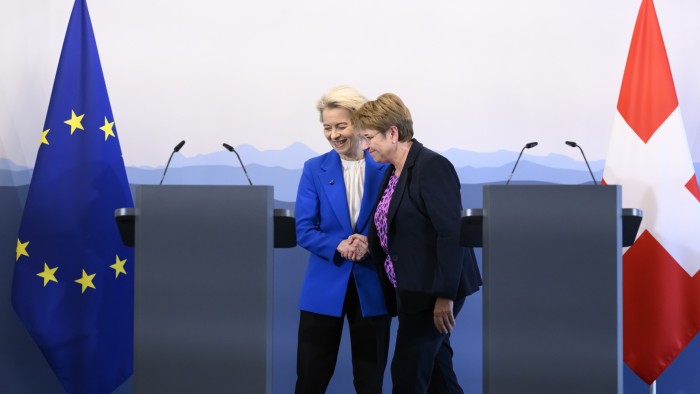Unlock the Editor’s Digest for free
Roula Khalaf, Editor of the FT, selects her favourite stories in this weekly newsletter.
Switzerland and the EU have reached a deal to deepen their long-standing economic and political ties after almost a decade of difficult talks, complicated by disputes over immigration.
The Alpine country would increase access to the EU single market that surrounds it, if the deal is ratified, but take on new immigration and financial commitments.
Ursula von der Leyen, Commission president, hailed the “historic” deal in a press conference in Bern with Swiss President Viola Amherd. The agreement will need to be approved by the Swiss parliament and possibly via one or more referendums, an unpredictable process that has scuppered draft agreements with the EU in the past.
The hard-right Swiss People’s Party (SVP), Switzerland’s largest, vowed to defeat the “subordination treaty”. “Undemocratic. Unworthy. Unacceptable,” it said in statement.
The SVP objects to the agreement paying €375mn annually into the EU budget in return for market access. It also rejects free movement of people, with Bern only allowed to limit immigration from the EU if a tribunal agrees it has caused serious economic damage.
Under the deal, a new animal and plant health agreement will remove checks on many products. Switzerland will be able to join the EU’s single electricity market, and its health bodies such as the European Centre for Disease Prevention and Control.
It could also be an associate member of research programme Horizon Europe, nuclear science body Euratom and the student exchange scheme Erasmus.
Switzerland is a member of the borderless Schengen zone. About 16 per cent of the Swiss population — 1.4mn — are EU citizens while around 400,000 Swiss citizens live in the EU.
The landlocked country is the EU’s fourth-largest trading partner, with more than €365bn of trade annually.
The EU accounts for about 42 per cent of Switzerland’s goods exports and 60 per cent of imports. The new deal would replace more than 120 bilateral agreements — complex arrangements that Brussels believed gave Bern favourable treatment.
The European Court of Justice, the EU’s top tribunal, will adjudicate on points of law in the event of disagreements over the application of the agreement. The role of the court has long been a sensitive issue for the Swiss.
Von der Leyen said: “Today marks a new chapter in our partnership as we elevate our co-operation to the next level and modernise the foundation of our strong relationship.”
The Swiss government said the deal came among “the growing influence of autocratic and protectionist ideas, the increasing number of conflicts and the fragmented global order”.
“In view of the current geopolitical challenges, both sides emphasised the importance of co-operation in Europe.”
Source link









